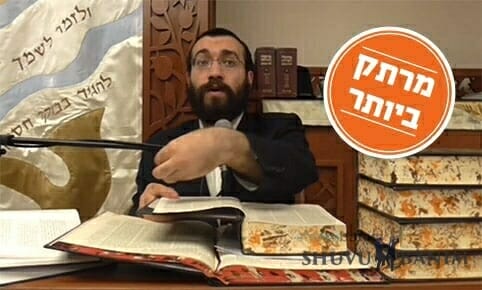Rav Michael Shmuel Revia shlit”a explains in a clear and painful fashion the evil consequences of controversy on the Tzaddik — How could Korach get up and dispute Moshe, the leader of the Jewish people? How could Korach invent false accusations against Moshe who was separated from all physicality and materialism, making claims so unseemly that even the most wicked people are far from.
These are his words:
“Parashas Korach teaches us the meaning of, “Torah scholars increase peace in the world, as it says, ‘And all your sons will be students of Hashem, and great will be the peace of your sons'” (Brachos 64a and Isaiah 54:13). We will learns in this shiur about Chochma (wisdom), the nobility of Moshe Rabbeinu. However many people would insult him, he would [still] be careful to walk between the raindrops [in order not to hurt those that hurt him]. How he would honor Korach in a way that you wouldn’t believe. This is precisely what the verse says.”
The most important people of the generation disputed Moshe Rabbeinu
“‘And they rose against Moshe, and people from the children of Israel, 250 leaders of the congregation, advisors, men of distinction’ (Bamidbar 16:2) — the choicest of the congregation, the most important people. ‘Men of distinction (anshey SHeM),’ ‘A good name (SHeM) is better than good oil (SHeMeN)’ (Kohelet 7:1) — people who were famous.
“And they congregated against Moshe and against Aharon, and said to them, ‘Enough already! — the entire congregation is holy and Hashem is amongst them. Why do you dominate the congregation of Hashem?’ (Bamidbar 16:3). They gathered against them, came against them with claims — What greatness you took for yourselves?! You, Aharon, were made Kohen Gadol (High Priest)! You, Moshe, were made King of Israel! You took the tribe of Levi for yourself! What about us?
“They said to Moshe Rabbeinu, as it were, ‘The entire congregation is holy’ (ibid.).’ Why do you behave with domination? At the time that we learned about Moshe Rabbeinu, ‘The man Moshe was very humble, more than any person on the face of the earth’ (Bamidbar 12:3). The Torah itself testifies for Moshe in Parashas Beha’alosecha. ‘And there never rose another prophet in Israel like Moshe, whom Hashem knew face-to-face’ (Devarim 34:10). There never rose [another] like Moshe in everything — in prophecy…in humility.”
Moshe was chosen by Hashem
“Hashem chose Moshe, ‘Not so My servant Moshe. In My entire house he is trusted’ (Bamidbar 12:7). The Gemara says that Hashem appoints even the water-drawer in each city, and here Korach and his congregation begin with their slander, that as it were, Moshe took the greatness for himself. Korach sees a Tzaddik, a servant of Hashem, but he says about Moshe that he acts like this because he’s pretending.”
Suspecting Moshe of Adultery
The gemara teaches; “‘And Moshe heard and fell on his face’ (Bamidbar 16:4). ‘This teaches that they suspected Moshe of adultery, as it says (Tehilim 106:16), “And they were jealous (vay’KaNu) of Moshe in the camp.” — That each person kept his wife and daughters away (KiNah) from Moshe’ (Sanhedrin 110). No less and no more. They said to Moshe Rabbeinu, ‘Oh what have we heard about you!’
“Ribbono Shel Olam! This is what they’re suspecting of Moshe? Three things Moshe did on his own initiative and didn’t ask Hashem, and Hashem agreed with him. One of them, he separated from Tzippora his wife. Moshe was separated from this entire matter [of physical relationship]. “Mouth-to-mouth I speak to him and explicitly and not in riddles, and at the image of Hashem he gazes, and why did you not fear to talk about My servant, about Moshe (Bamidbar 12:8). Moshe speaks to Hashem whenever he wants to. He can’t be bound at all to physicality.
“The Gemara relates (Baba Metzia, Perek HaPoalim) that when Rabbi Elazar ben Rabbi Shimon passed away, his friend Rabbi Yehuda HaNasi sent a letter to his daughter and requested to marry [Rabbi Elazar’s] wife. The Leader of Israel, the author of the Mishnah, descendent of King David, direct lineage to King David, and she answers: A vessel which was used for the holy will be used by something not holy?”
“Unbelievable! The wife of Rabbi Elazar says about someone who our Sages testify was holy, ‘I was a vessel for Rabbi Elazar BeRabbi Shimon. This is holy. How will I now be used as a vessel by what’s not holy?’ This is unbelievable, because about only a few of the Sages is the term ‘holy’ used, and Rabbi Yehuda HaNasi was one of them (Before Rabbi Yehuda passed away he held up his hands and proclaimed ‘With these ten fingers I toiled in Torah and I haven’t experienced even a pinky of pleasure in worldly pleasure), so how can we understand this?
The answer is that Rabbi Elazar suffered the hardship of the cave [that he dwelt in a cave with his father, Rabbi Shimon bar Yochai, for 13 years, submerged in dirt up to his neck, while subsisting on carobs and water and learning Torah the entire time.] This is something else altogether [which is why his widow considered Rabbi Yehuda Hanasi unholy compared to him].
“See about what they suspected Moshe Rabbeinu, who was holy of holies! They’re talking adultery about him, the thing he was most separated from. G-d help us, a person who committed adultery is punished with strangulation.”
They thought that they were disputing Moshe, but they were disputing Hashem
“‘And put in them [the sacrificial fire-pans] fire and place on them incense before Hashem tomorrow, and the man that Hashem chooses, he is the holy one. Enough for you, children of Levi‘ (Bamidbar 16:7). Rashi comments, ‘Enough for you’ — you took onto yourselves something too big by disputing Hashem. Rashi explains that even though not everything is explicit in the Torah, but [still] Moshe spoke many words to their hearts, trying to settle matters and convince them in all ways and fashions.
“Moshe Rabbeinu wants for the good of Israel. After the sin of the golden calf, Hashem wanted to wipe out Israel, G-d forbid, and start from scratch with Moshe. But Moshe answered, ‘Now, if You bear their sin…and if not, please erase me from Your book which You have written’ (Shemot 32:32). Moshe Rabbeinu is the merciful of the merciful. He has mercy on the fingernail of a Jew — not by accident was he chosen the leader of Israel. ‘Enough for you, children of Levi’ — Moshe pleads to them that he doesn’t want a controversy.
“Moshe says to them, I am here to lead you. I didn’t even choose this task. He said to Hashem, ‘Please Hashem, send the person you usually send’ (Shemot 4:13). I’m not worthy. But Hashem says, ‘Not worthy? You’re the most worthy.”
Moshe knows what will be the outcome of the controversy against him and does everything to prevent this
“Moshe spoke to them with wisdom, but they didn’t stand [the test], and were influenced by the incitement against Moshe. The Torah bears witness about them that they were responsible for their own deaths. Therefore, they were punished for this. Not only on their having disputed Moshe Rabbeinu, [as it says:] ‘Rav Chisda said, anyone who disputes his Rabbi is like someone who disputes the Divine presence’ (Sanhedrin 110a), but they were also punished for having caused their own deaths.
“Rashi asks, ‘Korach, who was sharp, what did he see [that caused him] this foolishness?’ He was one of the carriers of the Ark of the Covenant and an important man in Israel. He wasn’t stupid. Then how could he say to Moshe Rabbeinu, ‘Why do you dominate the congregation of Hashem’ (Bamidbar 16:3)?
“Rashi answers in the name of Midrash Tanchuma, Korach’s ‘eye led him astray.’ He had Ruach HaKodesh (Divine inspiration, a level of prophecy) which led him astray. He saw that Shmuel HaNavi is going to be descended from him — Shmuel, who is equal to Moshe and Aharon. Also Korach saw that 14 of 24 watches of the Kohen (priests in the holy Temple) are destined to be descended from him, who are destined to serve in the holy Temple on the platform.
“Korach said to himself, ‘If I die then all of these descendants won’t be born — therefore, there’s no chance that I’ll die.’ But Rashi explains that he didn’t see correctly, because his sons did teshuva and from them came all of his descedents. But ‘Moshe could see.’ Moshe could see correctly like with a clear looking-glass (aspaklaria hameira).
“Question: If Ruach HaKodesh led Korach astray to dispute Moshe, then why did Hashem ever give him Ruach HaKodesh? Because Hashem leaves to a person free will.
“Korach needed to respond in exactly the opposite way, saying, ‘On the contrary, because such Tzaddikim are destined to descend from me, I need to strengthen myself and be more humble. Rashi explains that Korach disputed the Shabbat, because the job of Shabbat is to bring peace, and Korach made controversy and dissidence.”
The video of the shiur of Rav Revia (in Hebrew):
The full shiur of Rav Revia (1h 17m):

















